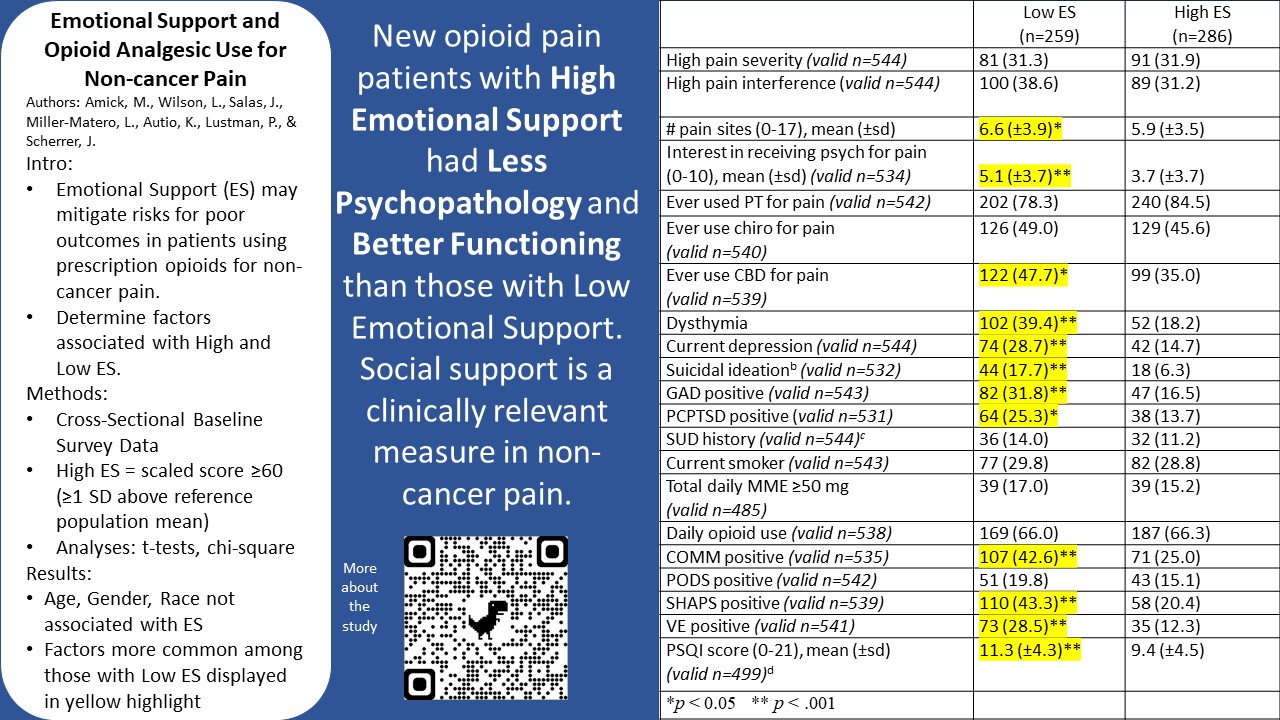PRP030: Emotional Support and Opioid Analgesic Use for Non-cancer Pain
Matthew Amick, MS; Lauren Wilson, LCSW; Joanne Salas, MPH; Jeffrey Scherrer, PhD; Lisa Miller-Matero, PhD; Kirsti Autio, LMSW; Patrick Lustman, PhD
Abstract
Context: Patients with non-cancer pain being treated with opioid analgesics are at an elevated risk of developing new onset depression and other mental illnesses. Emotional support may mitigate risk for opioid misuse and psychopathology in patients with non-cancer pain. Objective: Determine if aspects of pain, pain treatment, opioid use and misuse, and symptoms of mental illness significantly differ by low vs. high emotional support (ES) in a sample of OAU patients. Study Design: Cohort Study. Setting or Dataset: Participants from two large healthcare systems in the midwestern US were identified via electronic medical record and recruited by phone. Population studied: Eligible patients with non-cancer pain and a valid PROMIS ES score (n=545) who have a new (no opioid use in past 3 months) period of 30 to 90 day prescription opioid use. Outcome Measures: PROMIS ES scores indicated High ES (n=259) vs. Low ES (n=286) groups. Demographics, pain measures, opioid use and misuse, and mental illness. Results: Preliminary analyses indicate that patients with High ES have significantly less generalized anxiety, depression, PTSD, opioid misuse, vital exhaustion, and sleep impairment compared to those with Low ES. High ES was associated with significantly fewer number of pain sites. Low ES indicated greater interest in receiving psychological treatment for pain and greater likelihood to have tried CBD to alleviate pain. No significant differences were found for demographic data, use of physical therapy and chiropractic care, pain severity, pain interference, daily opioid use, daily opioid dose, and substance use disorder history. Based on preliminary analyses, it is anticipated that patients with High ES differ from those with Low ES in clinically meaningful ways. Conclusions: In the current sample, patients with high ES had less psychopathology and better functioning than those with low ES. Social support is a clinically relevant measure in non-cancer pain. Interventions to increase social support in this patient population are warranted.

Jack Westfall
jwestfall@aafp.org 11/21/2021This is a very important topic and research study. Nice work. Thanks for sharing at NAPCRG